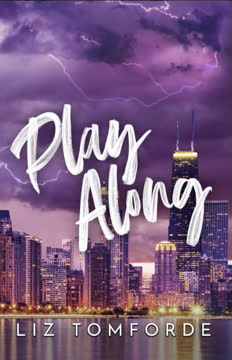Plot Summary
Unexpected Wedding, Unfamiliar Groom
Rose Coleson finds herself marrying Jack Hawthorne, a man she barely knows, in a stark city hall ceremony. The setting is far from her dream wedding, lacking warmth and joy. Jack, a stoic and enigmatic figure, stands beside her, his demeanor as cold as the room they occupy. Despite her reservations and the absence of love, Rose agrees to the union, driven by circumstances that promise to change her life. The ceremony concludes with a perfunctory kiss, marking the beginning of a marriage of convenience rooted in necessity rather than affection.
A Proposal of Convenience
Jack Hawthorne proposes a marriage of convenience to Rose, presenting it as a business deal. He offers her the opportunity to use a property she desperately needs for her coffee shop. Jack's motivations are pragmatic, seeking to enhance his image as a stable family man for professional gain. Despite her initial disbelief and reluctance, Rose considers the offer, recognizing the potential to fulfill her dream. The proposal sets the stage for a partnership that challenges both their perceptions of marriage and each other.
Coffee Shop Dreams and Dilemmas
Rose is determined to open her coffee shop, Around the Corner, on Madison Avenue. With Jack's unexpected support, she navigates the challenges of setting up the business. Their interactions are marked by a mix of tension and cooperation, as Jack's reserved nature contrasts with Rose's warmth and determination. As they work together, Rose begins to see glimpses of Jack's genuine character beneath his aloof exterior. The coffee shop becomes a symbol of Rose's independence and ambition, as well as a backdrop for their evolving relationship.
Navigating New Beginnings Together
Rose and Jack settle into a routine, navigating the complexities of their unconventional marriage. Despite their differences, they find a rhythm in their daily interactions, with Jack often helping Rose at the coffee shop. Their relationship is marked by unspoken understanding and subtle gestures of support. As they spend more time together, Rose's initial apprehension gives way to a growing sense of comfort and companionship. The boundaries of their arrangement blur, hinting at the possibility of deeper connections.
Unspoken Connections and Confessions
One evening, Rose and Jack share a candid conversation on the terrace, revealing personal histories and vulnerabilities. Rose opens up about her past, her family, and the loss of her uncle, while Jack hints at his own strained family relationships. The exchange deepens their understanding of each other, fostering a sense of intimacy that transcends their initial agreement. Despite their differences, they find common ground in their shared experiences of loss and longing for belonging.
Opening Day and Unforeseen Emotions
The grand opening of Around the Corner is a pivotal moment for Rose. Jack's unexpected gesture of support, bringing flowers and ordering coffee for his office, touches Rose deeply. The day is a success, with customers appreciating the cozy atmosphere and delicious offerings. Rose's gratitude towards Jack grows, and she begins to see him as more than just a business partner. Their interactions are filled with warmth and unspoken emotions, hinting at the potential for a genuine connection.
Tension and Tenderness in Transit
As Rose struggles with a persistent nose issue, Jack insists on accompanying her to the doctor. Their journey is marked by a mix of tension and tenderness, as Jack's stoic demeanor contrasts with Rose's vulnerability. Despite her discomfort, Rose finds solace in Jack's unwavering presence. Their interactions reveal a growing bond, as Jack's protective nature surfaces, and Rose begins to rely on him more than she expected. The morning sets the stage for a day filled with emotional revelations and deepening connections.
Unspoken Fears and Silent Support
At the doctor's office, Rose learns that her nose issue might be a cerebrospinal fluid leak, requiring further tests and possibly surgery. The news is overwhelming, and Rose struggles to process it. Jack, though outwardly calm, is deeply concerned and determined to support her. His silent strength becomes a pillar for Rose, who grapples with her fear of medical procedures. Their shared silence speaks volumes, as Jack's presence offers comfort and reassurance in the face of uncertainty.
A Kiss Amidst Uncertainty
As Rose and Jack navigate the emotional turmoil of her diagnosis, a tender moment arises. Jack's unexpected kiss offers Rose a brief escape from her fears, a gesture of genuine care that transcends their initial arrangement. The kiss, though simple, signifies a shift in their relationship, hinting at deeper feelings beneath the surface. It's a moment of vulnerability and connection, providing Rose with a sense of security and hope amidst the chaos.
Facing Fears, Finding Strength
With Jack by her side, Rose faces the daunting prospect of an MRI and potential surgery. Her claustrophobia and anxiety threaten to overwhelm her, but Jack's steady presence helps her find the courage to proceed. The experience is a test of their growing bond, as Jack's support becomes crucial in helping Rose navigate her fears. Together, they confront the challenges ahead, finding strength in their partnership and the promise of a future beyond the immediate crisis.
A Heartbreaking Revelation
After surgery, Rose learns of Jack's manipulations—he paid her ex-fiancé Joshua to leave her. This revelation shatters her trust, leaving her feeling betrayed and heartbroken. Jack's intentions, though rooted in a desire to protect her, are overshadowed by the deception. The confrontation is raw and emotional, with Rose questioning the foundation of their relationship. Jack's admission of love is met with skepticism, as Rose grapples with the duality of his actions—both savior and deceiver. The chapter explores themes of trust, love, and the complexity of human relationships.
Love's Unyielding Stand
Despite the betrayal, Rose's love for Jack remains steadfast. She refuses to sign the divorce papers he presents, determined to fight for their marriage. Her decision is fueled by the realization that Jack's actions, though misguided, were driven by love. The chapter delves into Rose's internal struggle, balancing her hurt with the undeniable connection she feels with Jack. Her refusal to give up on their marriage highlights the resilience of love, even in the face of adversity. This pivotal moment marks a turning point, as both characters confront their feelings and the future of their relationship.
A Marriage Reimagined
In a heartfelt conversation, Jack and Rose lay bare their emotions, acknowledging past mistakes and expressing their love for one another. They agree to move forward without the divorce, choosing to rebuild their marriage on a foundation of honesty and trust. The chapter captures the essence of forgiveness and the power of love to heal wounds. Jack's vulnerability and Rose's unwavering commitment to their relationship underscore the transformative nature of their bond. Together, they embark on a new chapter, determined to create a marriage that reflects their true selves.
Promises and New Beginnings
As they settle into their renewed relationship, Jack and Rose discuss their hopes and dreams for the future. They establish traditions and set goals, promising to prioritize their marriage and each other. The chapter highlights the importance of communication and shared aspirations in a successful partnership. Their plans reflect a deep understanding of one another, as they navigate the complexities of love and commitment. This chapter serves as a testament to their growth as individuals and as a couple, setting the stage for a future filled with promise and possibility.
Love's Unbreakable Bond
In the final chapter, Jack and Rose's love is celebrated in a series of tender moments and shared experiences. Their journey, marked by challenges and triumphs, culminates in a profound understanding of what it means to truly love and be loved. The chapter emphasizes the enduring nature of their bond, as they continue to support and cherish one another. Through laughter, tears, and unwavering devotion, Jack and Rose exemplify the power of love to overcome obstacles and create a life of joy and fulfillment. Their story concludes with a promise of forever, a testament to the unbreakable bond they share.
Characters
Rose Coleson
Rose is a passionate and independent woman, driven by her dream of opening a coffee shop. Her unexpected marriage to Jack is a pragmatic decision, yet she navigates the complexities of their relationship with grace and resilience. Despite her initial apprehension, Rose's warmth and sincerity gradually break through Jack's stoic exterior, revealing her capacity for empathy and understanding. Her journey is one of self-discovery, as she balances her ambitions with the evolving dynamics of her marriage.
Jack Hawthorne
Jack is a successful lawyer whose proposal of a marriage of convenience to Rose is rooted in practicality. His reserved nature and calculated demeanor mask a complex personality shaped by past experiences and familial tensions. As he spends more time with Rose, Jack's facade begins to crack, revealing glimpses of vulnerability and genuine care. His interactions with Rose challenge his perceptions of relationships, leading him to question the boundaries of their arrangement and his own emotions.
Bryan Coleson
Bryan is Rose's cousin, who views her as an outsider in the family. His antagonism towards Rose is fueled by a desire to claim the property she needs for her coffee shop. Bryan's confrontations with Rose and Jack highlight his manipulative nature and willingness to challenge their marriage. His presence serves as a catalyst for Rose and Jack to solidify their partnership and protect their shared interests.
Sally
Sally is Rose's enthusiastic and loyal employee at the coffee shop. Her positive attitude and dedication to the business make her an invaluable asset to Rose. Sally's friendship and support provide Rose with a sense of camaraderie and encouragement, helping her navigate the challenges of running a new business. Her presence adds warmth and humor to the coffee shop's atmosphere.
Owen
Owen is a skilled baker who works part-time at Rose's coffee shop. His expertise in creating delicious pastries complements Rose's vision for the business. Owen's friendship with Rose is based on mutual respect and shared goals, and his presence in the coffee shop contributes to its success. His interactions with Rose and Jack highlight the supportive network Rose has built around her.
Joshua Landon
Joshua is a catalyst for conflict, his actions revealing the depths of Jack's deception. His presence serves as a reminder of the past and the challenges Rose and Jack must overcome. Joshua's character embodies manipulation and self-interest, contrasting sharply with the genuine love and commitment Jack and Rose strive to build.
Plot Devices
Marriage of Convenience
The marriage of convenience between Rose and Jack serves as the central plot device, driving the narrative forward. Initially rooted in practicality, the arrangement challenges both characters to confront their perceptions of relationships and intimacy. As they navigate their unconventional partnership, the boundaries between convenience and genuine affection blur, leading to unexpected emotional connections and personal growth.
Coffee Shop as a Symbol
Rose's coffee shop, Around the Corner, symbolizes her independence and ambition. It serves as a physical manifestation of her dreams and a space where her relationship with Jack evolves. The coffee shop is a setting for pivotal moments in their marriage, from shared work to personal revelations. It represents both a new beginning for Rose and a catalyst for the deepening bond between her and Jack.
Unspoken Emotions
The narrative is rich with unspoken emotions and subtle interactions between Rose and Jack. Their evolving relationship is marked by small gestures of support and understanding, which gradually reveal the depth of their connection. These unspoken moments add complexity to their dynamic, highlighting the tension between their initial agreement and the genuine affection that develops over time.
Deception and Revelation
The revelation of Jack's deception serves as a pivotal plot device, driving the narrative forward and deepening the emotional connection between him and Rose. The challenges they face together reveal the depth of their bond, as they navigate the complexities of love and trust. The deception becomes an opportunity for growth and transformation, prompting both characters to reevaluate their feelings and the nature of their relationship.
Love as Redemption
Love serves as a powerful plot device, driving the characters' actions and decisions. Jack's love for Rose motivates his quest for redemption, while Rose's love for Jack fuels her determination to fight for their marriage. The narrative explores the transformative power of love, highlighting its ability to heal wounds, bridge divides, and create a foundation for a lasting partnership.
Analysis
"Marriage for One" by Ella Maise delves into the complexities of love, trust, and personal growth within the framework of a marriage of convenience. The narrative explores the transformative power of love, highlighting its ability to heal wounds, bridge divides, and create a foundation for a lasting partnership. Through the characters of Rose and Jack, the story examines the tension between practicality and genuine affection, as well as the challenges of navigating relationships marked by deception and revelation. The book ultimately conveys a message of resilience and redemption, emphasizing the importance of communication, trust, and shared aspirations in building a successful partnership. Through its exploration of unspoken emotions and the power of love to overcome adversity, "Marriage for One" offers a poignant reflection on the complexities of modern relationships and the enduring nature of love.
Last updated:
FAQ
0. Synopsis & Basic Details
What is Marriage for One about?
- A Pragmatic Union Evolves: Marriage for One introduces Rose Coleson, a determined woman whose dream of opening a coffee shop is jeopardized by her uncle's will. She enters a marriage of convenience with Jack Hawthorne, a stoic and successful lawyer, who seeks to enhance his professional image.
- Unforeseen Emotional Depths: What begins as a strictly business arrangement quickly becomes complicated as Rose and Jack navigate shared living, professional challenges, and unexpected personal crises, including Rose's serious health scare. Their initial distance gives way to a profound, albeit tumultuous, emotional connection.
- Redemption Through Honesty: The story delves into themes of trust, deception, and the transformative power of love, as both characters confront their pasts and the lies that brought them together. Ultimately, they must decide if their unconventional bond can evolve into a genuine, lasting partnership.
Why should I read Marriage for One?
- Grumpy-Sunshine Dynamic Masterclass: Readers seeking a deeply emotional romance with a compelling grumpy-sunshine trope will find Jack and Rose's journey captivating. Their contrasting personalities create constant tension and heartwarming breakthroughs, making their slow-burn connection incredibly satisfying.
- Rich Emotional Landscape: Beyond the romance, the novel offers a profound exploration of vulnerability, trust, and the search for belonging. Rose's resilience and Jack's hidden depths are meticulously unveiled, inviting readers to invest deeply in their individual and shared growth.
- Subtle Symbolism & Foreshadowing: Ella Maise weaves in clever literary devices, from the symbolic "Around the Corner" coffee shop to recurring motifs like Jack's elusive smile, rewarding attentive readers with layers of meaning and a richer interpretive experience.
What is the background of Marriage for One?
- Contemporary New York Setting: The story is firmly rooted in modern-day New York City, utilizing its bustling energy and diverse environments—from high-rise corporate offices to a cozy Madison Avenue coffee shop—to reflect the characters' aspirations and internal states. This urban backdrop highlights themes of ambition and the pursuit of dreams.
- Corporate Law & Entrepreneurial Dreams: The narrative contrasts Jack's high-stakes corporate legal world with Rose's passionate, hands-on endeavor of building her coffee shop. This juxtaposition underscores their differing values and lifestyles, which initially seem incompatible but ultimately find common ground.
- Familial Disconnect & Found Family: Both protagonists come from backgrounds marked by emotional distance and a lack of genuine familial connection. Rose's experience as an "unwanted niece" and Jack's strained relationship with his parents drive their subconscious longing for a true family, which they unexpectedly find in each other and their supportive circle.
What are the most memorable quotes in Marriage for One?
- "I'm not going to keep repeating myself, Miss Coleson. If you accept, we'll get married and the property will be transferred to me. After that, I'll honor the initial contract terms and you can go ahead with your plans." (Chapter 2): This quote perfectly encapsulates Jack's initial, purely transactional approach to their marriage, highlighting his cold, logical demeanor and setting the stage for the dramatic emotional shift that follows. It's a key moment for understanding Jack Hawthorne's motivations.
- "You're the most precious thing in the world to me, Rose." (Chapter 25): Uttered during their raw confrontation, this declaration from Jack reveals the true depth of his feelings, shattering his carefully constructed facade. It's a pivotal moment where his hidden love for Rose Coleson is finally laid bare, despite his earlier deception.
- "Your heart always has a home with me, Rose. No matter what, never forget that." (Chapter 27): This powerful promise from Jack, made after their reconciliation, signifies the complete transformation of their relationship. It underscores the central theme of finding belonging and unconditional love, cementing their bond beyond any initial contract.
What writing style, narrative choices, and literary techniques does Ella Maise use?
- First-Person Dual Perspective: The novel alternates between Rose's and Jack's first-person perspectives, offering intimate access to their thoughts, feelings, and internal conflicts. This narrative choice is crucial for understanding their unspoken emotions and the psychological complexity of their evolving relationship.
- Internal Monologue & Dialogue Subtext: Maise heavily relies on rich internal monologues, especially for Rose, to convey her anxieties, hopes, and growing attraction to Jack. Dialogue is often layered with subtext, particularly in early interactions, where characters say one thing but mean another, revealing their true feelings through subtle cues.
- Slow-Burn Emotional Pacing: The author employs a deliberate slow-burn approach to the romance, building tension and emotional depth gradually. This is achieved through repeated interactions, subtle gestures, and delayed gratification, making the eventual breakthroughs and declarations of love feel earned and impactful, a hallmark of Ella Maise's writing style.
1. Hidden Details & Subtle Connections
What are some minor details that add significant meaning?
- The "Ugly Orange Couch" Symbolism: In Chapter 1, Rose fixates on the "ugly orange couch" in the city hall, finding it "annoyed and offended" her the most. This seemingly trivial detail symbolizes her deep discomfort and disillusionment with the unromantic, transactional nature of her wedding, contrasting sharply with her idealized vision of marriage.
- Jack's "Due Diligence" Foreshadowing: Jack's early mention of doing his "due diligence" on Rose (Chapter 2) initially appears purely professional. However, it subtly foreshadows his deeper, personal interest and protective instincts, revealing he knew more about her situation and Joshua than he let on, hinting at his complex motivations.
- The "Titanic" Namesake: Rose's internal joke in Chapter 1, "After all, I was Rose, and he was Jack. We were doomed from the very beginning with those names. You know… the Titanic and all that," is a clever piece of foreshadowing. While seemingly lighthearted, it hints at the immense challenges and near-catastrophic events their relationship will face, yet ultimately, like the survivors, they find a way to endure and thrive.
What are some subtle foreshadowing and callbacks?
- Jack's Unwavering Presence: From the moment Jack starts picking Rose up from the coffee shop every night (Chapter 5), despite his initial coldness, his consistent presence foreshadows his deep commitment and protective nature. This callback to his initial "I'll be there" promise, even when unasked, subtly builds the foundation for their future.
- Rose's "Acquired Taste" Comment: In Chapter 17, Rose tells Jack, "Sometimes I can be an acquired taste. I know that." This subtly foreshadows Jack's later admission that he is the "acquired taste" in the relationship, highlighting his self-awareness of his difficult personality and his vulnerability in wanting Rose to accept him fully.
- The "Turtle" Pacing of Affection: Rose repeatedly teases Jack about his slow, "turtle-like" approach to physical affection, especially kisses (Chapters 13, 15). This recurring joke subtly foreshadows his eventual passionate intensity, making his later, more aggressive kisses a powerful payoff that demonstrates his unleashed desire and the depth of his feelings.
Who are the most significant supporting characters?
- Raymond, the Observant Driver: Raymond transcends the role of a mere driver, becoming a quiet confidante and a bridge between Jack and Rose. His genuine care for Rose, calling her "Mrs. Hawthorne" and offering support during her surgery (Chapter 19), subtly influences Jack's perception of their relationship and provides Rose with a sense of stability.
- Steve, the Warm Doorman: Steve, the doorman, represents the "found family" aspect of Rose's life in New York. His friendly interactions with Rose (Chapter 7, 12, 19) and later with Jack, humanize Jack and show his gradual integration into a community, highlighting Rose's positive influence on his character development.
- Cynthia, Jack's Loyal Assistant: Cynthia serves as Jack's moral compass and a keen observer of his emotional transformation. Her direct challenges to Jack about his deception and his feelings for Rose (Chapter 11) are crucial in pushing him towards honesty, revealing her deep understanding of Jack Hawthorne's motivations and character.
2. Psychological, Emotional, & Relational Analysis
What are some unspoken motivations of the characters?
- Jack's Deep-Seated Guilt: Beyond the desire to protect Rose from Joshua, Jack's intense guilt over his deception (Chapter 27) is a powerful unspoken motivator. His initial coldness and later self-sacrificing actions stem from a profound need to atone and prove his worthiness of Rose's affection, even if it means pushing her away.
- Rose's Longing for Belonging: Rose's quick acceptance of Jack's marriage proposal, despite her romantic ideals, is driven by an unspoken, lifelong yearning for a place to belong and a family to call her own. Her past as an "unwanted niece" (Chapter 5) makes her susceptible to the stability and protection Jack offers, even if it's initially a facade.
- Jack's Fear of Vulnerability: Jack's stoic demeanor and reluctance to express emotions are deeply rooted in his upbringing with emotionally distant parents (Chapter 17). His unspoken motivation is a fear of vulnerability and rejection, which makes his eventual emotional breakthroughs and declarations of love all the more significant for his character analysis.
What psychological complexities do the characters exhibit?
- Jack's Controlled Chaos: Jack exhibits a complex psychological struggle between his desire for control and the emotional chaos Rose introduces into his life. His meticulous planning and logical approach to the marriage contrast with his impulsive acts of care and protection, revealing a man constantly battling his own burgeoning feelings. This internal conflict is central to Jack Hawthorne's character development.
- Rose's Resilient Optimism Amidst Trauma: Rose displays a remarkable psychological resilience, maintaining optimism and humor despite a traumatic childhood and recent betrayals. Her tendency to "make light" of serious situations, like her CSF leak diagnosis (Chapter 16), is a coping mechanism that masks deep-seated fears of abandonment and vulnerability, showcasing her complex emotional depth.
- The Paradox of Deception for Love: Both characters grapple with the psychological paradox of building a relationship on a foundation of lies. Jack's deception, intended to protect Rose, ultimately causes her immense pain, forcing them to confront the ethical implications of their actions and the true meaning of trust in their relationship dynamics.
What are the major emotional turning points?
- Rose's CSF Leak Diagnosis: The revelation of Rose's cerebrospinal fluid leak (Chapter 16) is a critical emotional turning point. It shifts Jack's role from a detached business partner to a fiercely protective caregiver, deepening his emotional investment and forcing him to confront his feelings, moving beyond the initial transactional nature of their marriage.
- Jack's First Genuine Smile: Jack's first unforced smile at Rose during the charity event (Chapter 13) is a monumental emotional breakthrough. It symbolizes the thawing of his guarded exterior and the emergence of genuine affection, marking a significant step in their relationship dynamics and Rose's growing hope for a real connection.
- Rose's Refusal to Sign Divorce Papers: Rose's defiant refusal to sign the divorce papers (Chapter 26), despite Jack's deception, is a powerful emotional turning point. It signifies her active choice to fight for their love, demonstrating her unwavering commitment and her belief in the possibility of a real future together, even after betrayal. This is a key moment for Rose Coleson's character analysis.
How do relationship dynamics evolve?
- From Transactional to Intimate Partnership: The relationship begins as a purely transactional "marriage for one," focused on mutual benefit. Over time, through shared vulnerability, crisis, and unexpected acts of kindness, it evolves into a deeply intimate partnership where emotional support and genuine affection supersede the initial agreement.
- Grumpy-Sunshine to Mutual Vulnerability: Initially defined by Jack's stoicism and Rose's effervescent warmth, their dynamic transforms as Rose's persistent cheerfulness chips away at Jack's defenses. This leads to moments of mutual vulnerability, where both characters shed their masks and reveal their true selves, fostering deeper trust and understanding.
- Power Shift and Shared Control: The power dynamic, initially skewed towards Jack due to his wealth and control over the property, gradually shifts. Rose asserts her agency, particularly in her refusal to divorce and her demands for honesty. This evolution leads to a more balanced relationship where decisions are made collaboratively, reflecting a true partnership.
3. Interpretation & Debate
Which parts of the story remain ambiguous or open-ended?
- The Exact Genesis of Jack's Love: While Jack states he "fell for" Rose, the precise moment or catalyst for his profound love remains somewhat ambiguous. Was it her laughter with the puppy, her determination with the coffee shop, or her vulnerability during her illness? The narrative suggests a gradual, cumulative effect, leaving readers to interpret the exact turning point of Jack Hawthorne's motivations.
- The Long-Term Impact of Deception: Despite their reconciliation, the story leaves a subtle open question about the lasting psychological impact of Jack's initial deception on their trust. While Rose forgives him, the memory of the betrayal could resurface in future conflicts, prompting readers to consider the ongoing work required to maintain their bond.
- The Future of Their "Found Family": The novel beautifully establishes a "found family" with characters like Raymond, Steve, Sally, and Owen. While their support is evident, the long-term integration of these relationships into Jack and Rose's intensely private world remains somewhat open-ended, inviting speculation on how their expanded family will continue to shape their lives.
What are some debatable, controversial scenes or moments in Marriage for One?
- Jack's Payment to Joshua: The most controversial moment is Jack paying Joshua to break up with Rose (Chapter 24). Readers might debate the ethics of this action: was it a protective act to save Rose from a con man, or a manipulative move to clear the path for his own desires? This scene challenges the reader's perception of Jack Hawthorne's motivations and whether the ends justify the means.
- Rose's Quick Forgiveness: Rose's relatively swift forgiveness of Jack's profound deception (Chapter 27), despite her initial heartbreak, can be a point of contention. Some readers might find it unrealistic, while others may interpret it as a testament to her deep love, her longing for a stable family, or her understanding of Jack's underlying protective intentions.
- Jack's Initial Coldness and Lack of Communication: Jack's consistent aloofness and refusal to engage in emotional conversation, even after their marriage, sparks debate. Was this a necessary part of his "business deal" facade, or a genuine character flaw that Rose had to overcome? This aspect of Jack Hawthorne's character analysis raises questions about healthy communication in relationships.
Marriage for One Ending Explained: How It Ends & What It Means
- Symbolic Divorce and Re-Proposal: The ending of Marriage for One sees Jack presenting Rose with divorce papers, not to end their relationship, but to symbolically erase the foundation of deception and allow them to "start fresh." Rose's refusal to sign, followed by Jack's revelation that he's given her the coffee shop, acts as a powerful re-proposal, signifying a commitment based on genuine love, not convenience. This is a crucial part of the Marriage for One ending explained.
- Establishment of New Traditions and Promises: The couple explicitly outlines their desires for a real marriage, establishing traditions like "pasta day" and "Monday flowers," and making solemn promises of honesty, communication, and unwavering support. This signifies their commitment to actively building a healthy, loving relationship, directly addressing the issues of trust and emotional distance that plagued their initial arrangement.
- Unconditional Love and Belonging: The final chapters culminate in profound declarations of love and mutual belonging. Rose acknowledges Jack as her "family" and her "home," while Jack pledges eternal devotion, promising to always be there for her. This ending means that their journey, fraught with lies and challenges, ultimately leads to a powerful, unbreakable bond, fulfilling Rose's lifelong yearning for connection and Jack's hidden desire for a meaningful relationship.
Review Summary
Marriage for One is a polarizing romance novel with an average 3.85 rating. Many readers praise the slow-burn romance, grumpy-sunshine dynamic, and emotional depth between Jack and Rose. The marriage of convenience trope is well-executed, with compelling character development. Critics find the plot lacking and the book overly long. Some readers dislike the manipulative aspects of Jack's actions. Overall, fans of slow-burn romance and marriage of convenience stories tend to enjoy the book, while others find it tedious or problematic.
Similar Books
Download PDF
Download EPUB
.epub digital book format is ideal for reading ebooks on phones, tablets, and e-readers.
















